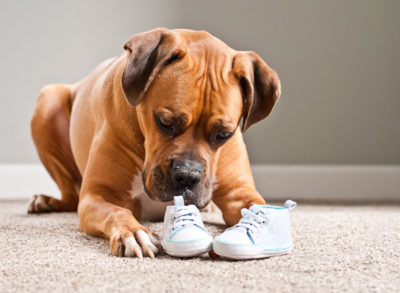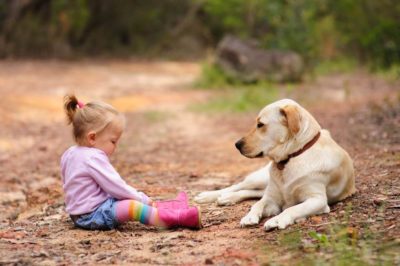Once baby has arrived, but before you and bub go home, arrange to have some of your baby’s items taken home for your dog to smell under supervision, for example, a soiled nappy and something baby has worn. As the dog sniffs the items, reward them with treats. If they pick up the items, distract them and reward a desirable behaviour, for example following the cue to sit for a treat. Put the baby clothes on the bassinet and play some of the baby sounds to your dog. At the same time talk to them in an upbeat voice as you tell them about the baby and use your baby’s name.

What to expect
So now you have prepared your dog to expect the sounds, smells and new routines associated with baby and it’s finally time to introduce them! Have someone take your dog for a walk a couple of hours before you arrive home to tire the dog slightly. Limit the number of people present at the first introduction to create a calm setting, however it’s handy to have someone to sit with baby in the car while your family initially greet your dog. This way, you can give your excited dog your calm attention without worrying about the baby being injured. Once your dog has calmed down, and you are able to relax, introductions may begin.
Whilst strictly controlling the amount of access the dog has to the baby, allow the dog to smell the baby. Reward calm behaviour with treats, pats and calm praise. Take it slowly and give your dog space to move away. Never force your dog to interact with the baby. If your dog is too excited, distract them away with food or play and try again when they are more settled. If the dog is uncomfortable or unsure around baby, separate your dog by putting them in their safe secure place and reward relaxed behaviour. There’s plenty of time for this introduction. It may help to restrict your dog to visual contact at a distance whilst you work on good things happening when baby is in sight.
Supervision
If your dog becomes highly focussed and repeatedly fixated on your baby’s sound or movement, they must be immediately and securely separated from baby. Veterinary behaviour advice must be sought.
No matter how gentle your dog is, never leave your baby unsupervised with your dog. If you need to leave the room, ensure you first safely and securely separate your baby and dog. This is also important when you take bub to visit friends and family with dogs and when baby sitters mind your baby. Maintain constant adult supervision such that you are no more than arm’s length from the baby if dog and baby are in the same room. When you are not available to supervise the dog must be separated from the baby by a secure barrier or locked door that cannot be breached by older children or unsuspecting visitors.
Ensure you still spend relaxing and enjoyable time with your dog after baby arrives to avoid your dog associating baby’s presence with being ignored. Make a point of rewarding calm and desirable canine behaviours. Throw your dog a tasty treat when they are relaxed or calmly tell them they are a ‘good dog’ while they enjoy a tasty chew on their mat.
Regular walking is an opportunity for fresh air and exercise that’s great for all the family. The more you exercise your dog with baby, the better their bond is likely to be. Seek advice if your dog is showing fearful behaviour on walks.
The toddler is a whole new ball game.
When bub becomes mobile, a whole new gamut of challenges arise and constant supervision is crucial. Dogs that aggressively protect their food, toys, resting place or owner attention can present great danger to the innocent baby or toddler. Watch out for the dog that freezes and stares when guarding one of these prized resources as this behaviour can precede a bite. Ensure your dog only accesses these items in a secure area away from bub and consult a behaviour veterinarian immediately.

Safe spaces
Create an area where your dog can safely retreat for ‘me time’ and not be disturbed when resting. Ensure they cannot be cornered or crawled on by an exploring child. Every family dog needs to have a ‘safe place’ away from you where they can retreat undisturbed. Spend time creating a positive association with a resting area the other side of a secure barrier. Seek veterinary behaviour advice if your dog become anxious when separated from you or growls when disturbed from rest.
For many of us, growing up with a pet has been an experience of fun and friendship and with preparation and care, we can offer this to our children as well. Relax and look forward to the benefits of your extended family.
Some final thoughts:
- Children who grow up with dogs are generally less self-centred, may have higher self-esteem, increased empathy and are more caring. There are many well documented health benefits both physical and mental.
- Children share deep and lasting friendships with their pets through fun times and tough times.
- 70% of all dog bites occur at home from a dog familiar to the child.
- Causes of dog bites include: the dog is frightened of the baby or the noises or movements they make; the dog perceives the baby as a threat to valued resources like food, their resting area or their owner’s attention; the dog experiences conflict because they are no longer permitted to behave as he did before; the dog suffers from separation distress, noise phobias, pain or illness.
- A small number of dogs may display predatory aggression towards a baby. If you are concerned or your dog shows stalking, strong focus, strange whining or unusual interest in the baby, seek assistance from a behaviour veterinarian.
- Basic hygiene considerations include regularly deworming your dog to prevent parasite infection of the family; poop scoop the yard daily, and wash doggy bedding and vacuum very regularly. Always wash hands before meals, after cleaning the yard or touching your dog; ensuring the nappy bucket has a firm sealing lid and putting disposable soiled nappies out of reach of your dog and prevent your dog from licking baby’s face. This can be a dangerous behaviour as well as an easy way to spread worms.
- Have a vet check any skin conditions or gastro issues in your dog promptly. Arrange for your dog to receive a full check-up well before the birth so that you can prepare for their health needs. Painful conditions including arthritis, ear infections, dental pain or itchy skin can reduce a dog’s tolerance to change or to toddler’s advances. Remember to store you dog’s medications in a child-proof cabinet.
- Dog appeasement pheromone is a synthetic form of a calming pheromone that can have a relaxing effect on some dogs in stressful situations such as introducing a new baby. It comes in a diffuser, spray or collar and has no side effects for you or bub.
Some anxious dogs need veterinary behavioural help to treat anxiety before they can properly cope with the new family routine. Call us on (02) 6230 2223 to discuss our behaviour service or book an extended behaviour consultation.
